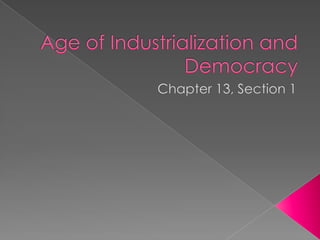
Industrial Frontiers Fuel New Inventions & Growth
- 3. Steel, chemicals, electricity, and oil were the new industrial frontiers.
- 4. methods for shaping New steel made it possible to build lighter, smaller, and faster machines, engines, railro ads, and more.
- 5. Thenew energy form of electricity was quite valuable because it was convertible into heat, light, or motion. By1910 hydroelectric power stations and coal-fired steam generating plants allowed houses and factories to have a single, common power source.
- 6. made way for Electricity inventions such as the light bulb invented by Joseph Swan in Great Britain and Thomas Edison in the United States.
- 9. electric With lights factories never had to stop production.
- 10. Bythe 1880s streetcars and subways powered by electricity appeared in European cities.
- 11. Thedevelopment of the internal- combustion engine provided a new power source for transportation and new kinds of transportation—ocean liners, airplanes, and the automobile.
- 13. sales of Increased manufactured goods due to the new forms of transportation caused industrial production to grow. increased after 1870. Wages
- 14. Great Britain, the Netherlands, Belgium, France, and other countries had a high standard of living. Spain, Portugal, Russia, Austria- Hungary, the Balkans, and southern Italy were agricultural and much less wealthy. They provided the industrialized nations with food and raw materials.
- 15. Europeans were receiving goods from all corners of the world. European capital was invested abroad to develop railroads, power plants, and other industrial projects. Europe dominated the world economy by 1900.
- 17. Industrialworkers formed socialist political parties and unions to improve their working conditions. Karl Marx and Friedrich Engels published The Communist Manifesto. › They were appalled by industrial working conditions and blamed capitalism.
- 18. Theyproposed a new social system. Oneform of Marxist socialism was eventually called communism.
- 19. Marx believed world history was a history of class struggle between the oppressing owners of the means of production and the oppressed workers. The oppressors controlled politics and government; therefore, government is an instrument of the ruling class.
- 20. Marx believed that society was increasingly dividing between the bourgeoisie (middle-class oppressors) and the proletariat (working-class oppressed), each hostile to the other. Marx predicted the conflict would result in a revolution in which the proletariat would violently overthrow the bourgeoisie and form a dictatorship (a government in which a person or group has absolute power).
- 21. revolution would The ultimately produce a society without classes and class conflict. Socialist parties emerged in other European states.
- 22. PureMarxists looked to overthrow capitalism violently. OtherMarxists, called revisionists, rejected this revolutionary program and argued to work with other parties for reforms. Democratic rights would help workers achieve their goals.
- 24. worked for evolutionary, not revolutionary, change. In Great Britain in the 1870s unions won the right to strike. Trade union workers used the strike to achieve other reforms. By 1914 trade unions had made great progress in many European countries toward improving conditions for the workers.